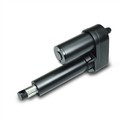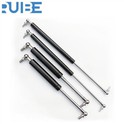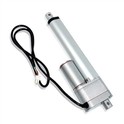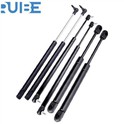Hey there! As a supplier of Cabinet Gas Dampers, I often get asked if these nifty little devices can be used on cabinets in high - traffic areas. Well, let's dive right into it and find out.
First off, let's understand what a Cabinet Gas Damper is. A cabinet gas damper is a hydraulic or gas - filled mechanism that controls the movement of cabinet doors or drawers. It ensures that they open and close smoothly, quietly, and with a certain degree of control. Instead of slamming shut or flying open uncontrollably, the damper slows down the motion, providing a more refined user experience.
Now, when we talk about high - traffic areas, we're referring to places where cabinets are used frequently throughout the day. Think of kitchens in restaurants, offices with lots of staff accessing storage cabinets, or even busy households with kids constantly opening and closing cabinets. In these areas, cabinets take a real beating. They're opened and closed quickly, sometimes roughly, and they need to withstand a high volume of use.
So, can cabinet gas dampers handle this kind of abuse? The short answer is yes, but with a few considerations.
Durability
One of the key factors is the durability of the gas damper. High - traffic areas demand a damper that can stand up to repeated use. Good quality cabinet gas dampers are designed with high - strength materials and precision engineering. The cylinders are usually made of strong metals that can resist wear and tear. The seals are also crucial, as they prevent the gas or hydraulic fluid from leaking out over time.
When you choose a gas damper for a high - traffic cabinet, look for ones that are rated for a high number of cycles. A cycle is one complete opening and closing of the cabinet door or drawer. A well - made damper can handle hundreds of thousands of cycles without losing its effectiveness. This means that even in a busy environment, it'll keep performing well for a long time.
Resistance to Environmental Factors
High - traffic areas can also expose cabinets to various environmental factors. In a kitchen, for example, there might be high humidity, steam, and splashes of water. In an industrial setting, there could be dust, grease, or chemicals. Cabinet gas dampers need to be able to resist these elements.
Some dampers come with special coatings or seals that protect them from moisture and corrosion. This is essential for maintaining their performance over time. If a damper gets corroded, it can start to malfunction, leading to a noisy or jerky operation of the cabinet door or drawer.


Adjustability
Another important aspect is adjustability. In a high - traffic area, different users may have different preferences for how they open and close cabinets. Some people might like a slower, more gentle closing, while others might prefer a slightly faster one. A good cabinet gas damper should be adjustable so that you can fine - tune the damping force according to your needs.
This adjustability also comes in handy if the cabinet experiences changes in its usage over time. For example, if a restaurant expands and has more customers, the cabinets might get used more frequently. You can then adjust the dampers to ensure they still function smoothly.
Cost - Effectiveness
Let's talk about money. In high - traffic areas, you might be tempted to go for the cheapest gas dampers available. However, this can be a false economy. Cheaper dampers are often made with lower - quality materials and may not last as long. You'll end up having to replace them more frequently, which can actually cost you more in the long run.
Investing in high - quality cabinet gas dampers is a smart move. They may cost a bit more upfront, but their durability and performance will save you money over time. Plus, they'll provide a better user experience, which is important in a high - traffic environment.
Compatibility
It's also crucial to ensure that the gas damper is compatible with your cabinet. Different cabinets have different sizes, weights, and types of doors or drawers. A gas damper that's too weak for a heavy cabinet door won't be able to control its movement properly. On the other hand, a damper that's too strong for a lightweight drawer can make it difficult to open and close.
Before purchasing a gas damper, measure the weight and dimensions of your cabinet door or drawer. Check the product specifications of the damper to make sure it's suitable for your needs. Some suppliers, like us, offer technical support to help you choose the right damper for your cabinets.
Comparison with Other Types of Dampers
There are other types of dampers available in the market, such as mechanical dampers. While mechanical dampers can be cheaper, they often don't offer the same level of smoothness and quiet operation as gas dampers. In a high - traffic area, the noise from a mechanical damper can be a real nuisance.
Gas dampers also tend to be more reliable over time. Mechanical dampers may require more maintenance and can break down more easily. So, when it comes to high - traffic cabinets, gas dampers are usually the better choice.
If you're also in the automotive industry, you might be interested in Gas Damper for Car. Although the application is different, the principles of smooth operation and durability are similar.
Conclusion
In conclusion, cabinet gas dampers can definitely be used on cabinets in high - traffic areas. They offer a smooth, quiet, and controlled operation that's essential in a busy environment. However, you need to choose the right damper based on durability, resistance to environmental factors, adjustability, cost - effectiveness, and compatibility.
If you're looking for high - quality cabinet gas dampers for your high - traffic cabinets, we're here to help. We've got a wide range of products that are designed to meet the needs of different applications. Whether you're a restaurant owner, an office manager, or a homeowner with a busy household, we can provide you with the perfect solution.
Don't hesitate to reach out to us if you have any questions or if you're ready to start a purchase negotiation. We're committed to providing you with the best products and services.
References
- Industry standards for cabinet gas dampers
- Manufacturer's specifications and product literature






